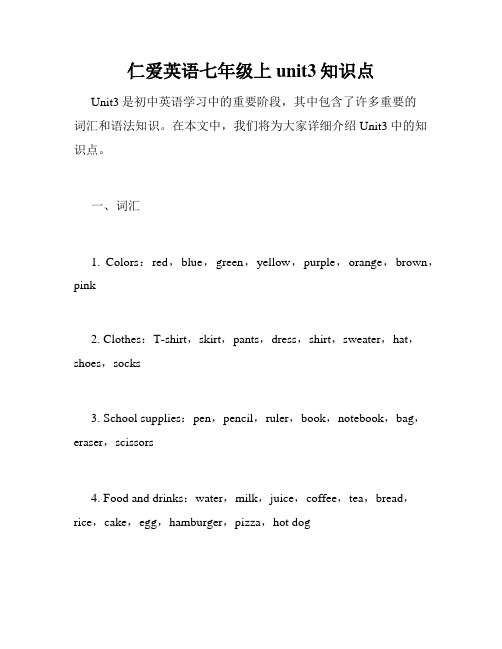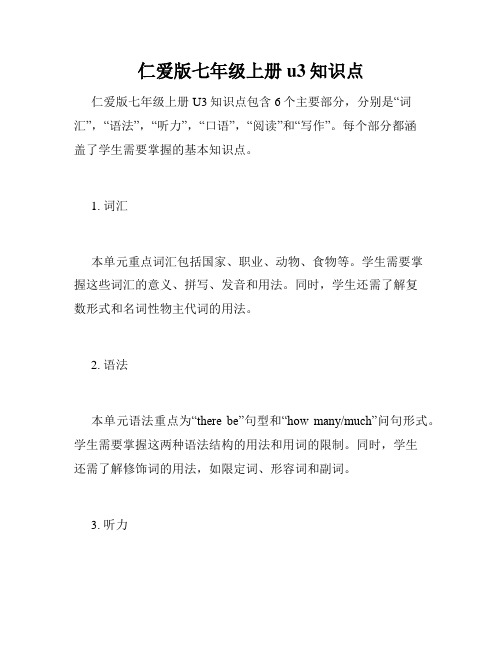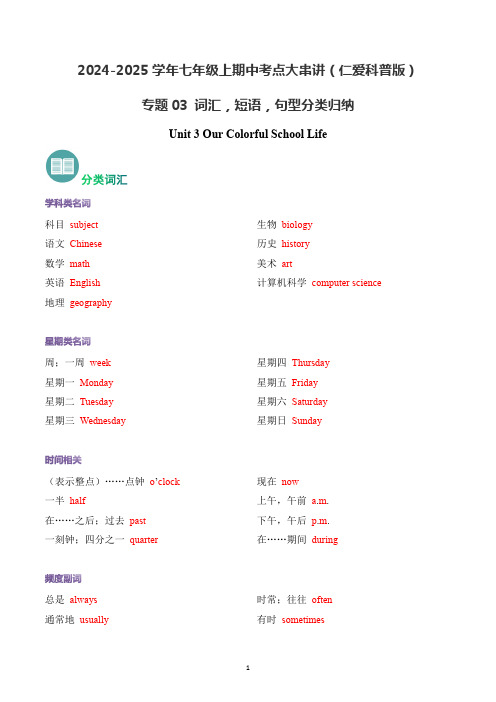仁爱版七年级英语上册Unit3知识点总结
仁爱英语七年级上unit3知识点

仁爱英语七年级上unit3知识点Unit3是初中英语学习中的重要阶段,其中包含了许多重要的词汇和语法知识。
在本文中,我们将为大家详细介绍Unit3中的知识点。
一、词汇1. Colors:red,blue,green,yellow,purple,orange,brown,pink2. Clothes:T-shirt,skirt,pants,dress,shirt,sweater,hat,shoes,socks3. School supplies:pen,pencil,ruler,book,notebook,bag,eraser,scissors4. Food and drinks:water,milk,juice,coffee,tea,bread,rice,cake,egg,hamburger,pizza,hot dog5. Family members:father,mother,sister,brother,grandfather,grandmother,uncle,aunt,cousin6. Numbers:one,two,three,four,five,six,seven,eight,nine,ten,eleven,twelve,thirteen,fourteen,fifteen,sixteen,seventeen,eighteen,nineteen,twenty二、语法1. 介词介词是英语中非常重要的语法部分,Unit3中包含了多个常用的介词,如in,on,at,with,to等。
这些介词的正确使用能够帮助我们更加准确地表达自己的意思。
例如:She is sitting on the chair.He is going to the store.The book is in the bag.2. 形容词和副词形容词和副词也是英语语法中的重要部分。
在Unit3中我们学会了很多形容词和副词,如big,small,happy,sad,fast,slow 等等。
仁爱英语七年级上册unit3topic1知识总结

Unit3. Topic1. Do you like English?一.核心词汇could tell sure speak some pour with problem pet often want live say visit great wall many lot all so study little them very much home its dog any of二.常用词组pen pal help sb with sth want to do sth the Great Wall a lot not…at all each other a little very much at home三.重点句子He can speak some Chinese. Do you like Chinese? Yes, I do/ No, I don’t What does he say in the letter? He wants to visit the Great Wall. Many students in our class like English a lot, but I d on’t like it at all. And I help her study Chinese. We help each other.四.交际用语Excuse me, could you please tell me your name? Sure. Could you help me with it. No problem. Do you like English? Yes, I like it very much/a lot/ a little.五.语法精粹do 和does引导的一般疑问句及其肯定和否定回答Do you want a pen pal? Yes, I do./No, I don’t. Does he speak Chinese? Yes, he does./ No, he doesn’t. 表示喜欢的程度I like it very much/a lot/ alittle. I don’t like it at all. 人称代词的用法六.其他情态动词could 的运用学习辅音音标/tr/ /dr/ /ts/ dz/七.金点剖析1.Excuse me, could you please tell me your name? 打扰一下,请把你的名字告诉我好吗?(1)“Could you please+动词原形+其他?”用于礼貌的请求别人做某事,译成“你能….吗?肯定答语用Sure/Of course.或No,problem。
仁爱版七年级上册u3知识点

仁爱版七年级上册u3知识点
仁爱版七年级上册U3知识点包含6个主要部分,分别是“词汇”,“语法”,“听力”,“口语”,“阅读”和“写作”。
每个部分都涵
盖了学生需要掌握的基本知识点。
1. 词汇
本单元重点词汇包括国家、职业、动物、食物等。
学生需要掌
握这些词汇的意义、拼写、发音和用法。
同时,学生还需了解复
数形式和名词性物主代词的用法。
2. 语法
本单元语法重点为“there be”句型和“how many/much”问句形式。
学生需要掌握这两种语法结构的用法和用词的限制。
同时,学生
还需了解修饰词的用法,如限定词、形容词和副词。
3. 听力
本单元听力内容包括旅游信息和对话等。
学生需要通过听力训练来提高自己的英语听力水平。
同时,学生还需了解听力技巧,如注意力集中、预测和判断等。
4. 口语
本单元口语包括日常用语、问候和介绍等。
学生需要掌握这些口语表达的用法和正确发音。
同时,学生还需加强口语训练,如练习对话、模拟情境等。
5. 阅读
本单元阅读内容包括短文和对话等。
学生需要通过阅读理解来学习新词汇和语法结构。
同时,学生还需了解阅读技巧,如确定主旨、推理和固定句型等。
6. 写作
本单元写作任务为介绍自己所在城市。
学生需要运用本单元学习的词汇和语法来完成作文。
同时,学生还需注意用词准确、语法正确和结构合理。
仁爱版七年级上册英语笔记Unit3Topic3-Unit4Topic1知识点总结

仁爱版七年级上册英语笔记Unit3Topic3-Unit4Topic1知识点总结U 3 T3—U4 T11.1)would like = wantwould like没有人称和数的变化I would like an egg.=I want an egg.He would like an egg.= He wants an egg.(would like不能加s)2)would like to do = want to doa. He would like to drink some water.(drink)=He wants to drink some water.b. She would like (visit) the Great Wall.=She the Great Wall.3)I would like=I’d like He would like=He’d like4)a. I’d like an egg.(一般疑问句) Would you like an egg?Yes,please./ No,thanks.b. He’d like a hamburger.he a hamburger?. / .5)Would you like some chicken?(用some 加强语气,表示强调)6)I’d like an egg.What would you like?He’d like some fish.he ?2.1)you—yourself(反身代词)2)yoursel f---yoursel ves(pl.)3.help yourself/yourselves to +n.:随便吃……a. Help yourself (you) to some chicken, Tom.b. Help yourselves (you) to some chicken, kids.4.1)可数名词[C]:有单数和复数的形式.2)不可数名词[UC]:一般没有复数的形式.3)常见的不可数名词有:milk,rice,fish(鱼肉),chicken(鸡肉),(apple/orange) juice,water,bread5.fish:1)作为“鱼” , 是可数名词.fish—fish(pl.)2)作为“鱼肉”, 是不可数名词.some fish6.chicken:1)作为“鸡” , 是可数名词.a chicken2)作为“鸡肉”, 是不可数名词.some chicken7.some + n.(pl.),some+ [UC]some eggssome fish/chicken/milk/apple juice/rice8.---Help yourselves.---Thank you.9.---Would you like…? ---Yes, please. /No, thanks.10.What/How about +sb(宾格)/sth?What about him/her/some milk?11.All right.行,好吧(表示对别人的建议表示赞同)---I’d like some rice and chicken.---All right./doc/6e6981861.html,k for me.13.Me,too.14.表示建议:---What about …? ---Good idea.15.an ideaa good ideaHomework:1.I’d like a hamburger.(一般疑问句) a hamburger?(肯否回答) ./ .2.She’d like some orange juice.she ?3. , boys and girls.(随便吃些鸡肉吧)4.She likes it very much.(否)She it .5..(我想喝些牛奶).6.他们怎么样?Unit 3 T 3 Section B—D1.1)usually:70-80%,often:50-60%2)usually,often放在be之后,行为动词之前.I usually have breakfast at home.2.have…for breakfast/lunch/supper/dinner1)He usually has an egg and some milk for breakfast.2)We usually have some rice and chicken for supper.3.一日三餐前不加a/an/the,后不加s.What do you usually have for/ breakfast?4.1)He usually has some bread for lunch.What does he usually have for lunch?2)We usually have some juice and fish for dinner. usuallyfor dinner?5.have:1)有2)吃,喝:have milk/bread6.[UC]前面不加a/an/the,后不加s.He has / milk and/ bread for breakfast.7.What/How about +sb(宾格)/sth?8.with带着/有,(表示伴随关系)have chicken/fish with vegetables9.some rice10.three meals(餐):breakfast,lunch,supper/dinner11.food:[UC],食物的总称,作主语,谓语用单数.My favorite food is (be) chicken and fish.12.Chinese /English food13.wait(v.)—waiter(指人)(男服务员)---waitress(女服务员)14.take one’s orderMay I take your order?15.something to drink/eat1)修饰词如不定式(to do) ,形容词修饰something时,放在something之后.2)something:某事(肯定句)anything:任何事(否/疑问)nothing:没有什么事(表否定意思的陈述句)3)Would you like +something?Would you likesomething to eat ?16.[UC]表示数量的表达法:1)a glass of apple juice/watera bag of rice /milk2)a glass of apple juice---two/some glasses of apple juice3) a bag of milk---five bags of milk17.wait/just a moment18.Let me see.让我想一想.I see. 我明白了.19.1)Would you like some vegetables?2)some vegetables/rice20.something to drink21.banana juice----Section C1.eat out2.eat---eating(现在分词)3.would like to doWould you like to have (have) dinner with me?4.have / breakfast/lunch/supper/dinner5.with sb(宾格)6.Would you like to have lunch with him?7.Yes, I’d like/love to.(to不能省略)8.1)May/can I help you?=What can I do for you?2)情态动词may/can/could+动原May I help (help) you?9.sir—madam(对应词)10.What would you liketo eat (eat)?11.Why not+动原? =Why don’t you +动原?Why not study (study) with me? = Why don’t you study with me?12.表示建议:1)What about…? 2)Why not…?肯定回答:Good idea.13.Here you are.14.---Would you like sth to drink?---Yes,please./No,thanks.Section D1.in+地点: in China2.many+n(pl.)many friends3.1)all,bothall指三者或三者以上“都”both指两者“都”2)all,both放在be之后,行为动词之前They are all students.We all like school.4.be kind to sbThe teacher is kind to us.5.have dinner with them6.such as +若干例子7.Sichuan food8.be glad to do sthObama is glad to visit (visit) the Great Wall.9.1)here,there是介词,前不加介词.2)be here/thereI’m glad to be (be) here.10.let sb do sthLet me (I) see (see).Homework:1.他晚饭通常吃什么?he usually2.你可以点菜了吗?3.Tom,为什么不随便吃些汉堡包呢,?,Tom?4.你想喝些什么东西吗?来两杯香蕉汁. Would you like.5.She’s glad (be) there.6.I’d like (work) with you.7.Would you like something (say)?8.Why not (tell) him about it.= him about it.9.他对我很友善.He .10.I usually have some rice for lunch. usually for lunch?1.---Do you like…?---Yes, I like …very much/a lot/a little. (No, I don’t like …at all.)Section D1.at / homeHe has a dog at home.2.it’s, its(它是)(它的)a cat. name’s Mimi.3.Tommy =T om4.Zhou Lan likes it a lot.= Zhou Lan likes it very much. (否)Zhou Lan doesn’t li ke it at all.5.some,anyShe has some pets.(否)She doesn’t have any pets.(疑问)Does she have any pets?6.1)人称代词:主格---宾格I—me,you-you,he-him,she-her,it-itwe-us,they-them2)形物代—名物代my-mine,your-yours,his-his,her-hers,its-its,our-ours,their-theirsThis is a girl. name is Lily. is twelve. We like .(Her,She,her) Unit 4 T1 Section A1.What can I do for you?=Can/May I help you?2.madam---sir(对应词)3.want to do = would like to do1)She wants to have milk and bread.=She would like to have milk and bread.2)Would you like a glass of apple juice?=Do you want a glass of apple juice?3)Would she like some vegetables?=Does she want any vegetables?4.clothes:衣服的总称,复数名词,作主语时,谓语用复数形式。
新仁爱版七年级英语上册期中复习专题03 Unit 3 词汇,短语,句型分类归纳【知识清单】(背诵版)

2024-2025学年七年级上期中考点大串讲(仁爱科普版)专题03 词汇,短语,句型分类归纳Unit 3 Our Colorful School Life科目subject 语文 Chinese 数学 math 英语 English 地理 geography 生物 biology 历史 history 美术 art计算机科学 computer science周;一周 week 星期一 Monday 星期二 Tuesday 星期三 Wednesday 星期四 Thursday 星期五 Friday 星期六 Saturday 星期日 Sunday(表示整点)……点钟 o ’clock 一半 half在……之后;过去 past 一刻钟;四分之一 quarter 现在 now 上午,午前 a .m . 下午,午后 p .m . 在……期间 during总是 always 通常地 usually时常;往往 often 有时 sometimes不常,很少seldom从不never(表示方式);(表示实施者)by 乘坐;带去;携带take地铁underground飞机plane 火车train 大船ship 小船boat 小汽车car图书馆library建筑物;楼房building 操场playground楼层;地板floor花园garden礼堂;大厅hall教室classroom 黑板blackboard 书桌desk椅子chair铅笔pencil直尺ruler书包schoolbag开始begin开始;开头start停止stop结束;终止end来;来到come开门;打开;张开open 放;安置put浇水water提升;举起;筹集raise 使成为;使得;做make 询问;请求ask回答;答复answer找到;发现find学习;记住learn参加;加入join想要;需要want 为……着色color生活;生命life(pl. lives)方式;方面;路way俱乐部;社团club歌曲song参与;部分part游戏;比赛game乐趣fun旗帜;旗flag手;帮助hand问题question美国人American国家country城市city 房间room刀knife(pl. knives)盒;箱;方框box瓶子bottle玻璃杯;眼镜glass菜肴;餐具dish番茄tomato果汁juice水water花朵flower球ball颜色color网页web page丰富多彩的colourful 特别受喜爱的favorite 受欢迎的welcome更多的more整洁的tidy 有趣的fun有趣的;有吸引力的interesting 国家的;民族的national美国的American丢失的;迷路的lost第一;首先first因为because结束;遍及;在……上面over 在……附近near紧挨着的;下一个的next任何的,任一的any 出来;在外面outon Thursday afternoon在星期四下午on the morning of every Monday在每个星期一的早上during the day在白天be over结束at the start of在……的开始on the playground在操上be at the music class在上音乐课at/in the club在社团the way of ... ……的方式by underground(介词短语)坐地铁take the underground(动词短语)坐地铁on foot步行far from... 离……很远;远离……next to紧邻a history of… ……的历史school life校园生活tell about告诉(某人)有关……的情况put on上演,上映raise the national flag升国旗have PE classes上体育课raise one’s hand举手answer questions回答问题after class下课后after school放学后in class在课上want to do想要做某事take part in参加learn to do sth. 学习做某事join the club加入社团take photos照相play sports做运动go to the library去图书馆find out找出,查找know about知道,了解have great fun玩得开心What time is it now?/ What’s the time? 现在几点了?It’s eight o’clock. 现在是8点钟。
七年级仁爱版unit3知识点总结

七年级仁爱版unit3知识点总结七年级的学习生涯可以说是对中学基础知识进行各方面的系统化学习,Unit3作为其中的一部分,承载了一定的英语知识点。
那么今天就由我来为大家总结一下Unit3中需要掌握的英语知识点。
一、词汇1.人称代词如:I,you,he,she,it,we,they2.动词如:be动词(变化)am,is,are;do动词一般现在时(变化)do,does;don't和doesn't是否定形式;现在分词;过去式;过去分词(变化);否定式(变化)3.形容词比较级,最高级4.其他如:a little,a few等等二、语法1. be动词的肯定、否定和疑问句如:肯定句:My mother is a teacher.否定句:My mother is not a teacher.疑问句:Is your mother a teacher?2. 有/没有如:Do you have a pen?/Do you have any brothers or sisters?3. 一般现在时的构成及其肯定、否定、疑问句形式如:构成:主语+动词原形肯定句:I like music.否定句:I don't like music.疑问句:Do you like music?4. 形容词比较级和最高级比较级如:good-better,bad-worse 等最高级如:good-the best,bad-the worst 等5. 特殊疑问词及其用法如:what,who,how,when,where,why 等等三、听力1. 听力中的基础提问如:Who is the boy in the picture?2. 听力中的基础描述如:This is a big house with a garden and a swimming pool.四、口语和阅读1. 熟悉Unit3的所有单词和短语如:grandfather,grandmother,cousin,uncle,aunt 等等2. 大声朗读教材中的文章如:Unit3 Part A 1a-2d3. 写作写一篇简短的英文日记,描述自己最近的生活,并描写家里的极简状况。
仁爱版七年级上册英语unit3知识点

仁爱版七年级上册英语unit3知识点仁爱版七年级上册英语Unit 3知识点
Unit 3主要涵盖了一些日常生活中常用的时间、日期、天气以
及习惯用语等知识点。
下面我们来看一下这些知识点的具体内容:
一、时间和日期
1. 表示时间:
(1)具体时间的表达法
如:8:40 eight forty
(2)特定时间的表达法
如:7:00 seven o’clock
2. 表示日期:
(1)日期的表达法:
如:September 9th
(2)缩略词的使用:
如:Sept.9th
二、天气
1. 询问天气:
What’s the weather like today?
2. 回答天气:
It’s sunny/cloudy/rainy/windy.
三、习惯用语
1. 在学校
(1)上课: Have a class
(2)接受——做功课: Do homework
2. 家庭生活
(1)洗衣服: Do the laundry
(2)做饭: Cook
以上就是Unit 3的主要知识点,大家可以结合教材内容及时练习,加强自己的语言应用能力。
完成Unit 3的学习后,同学们不仅能够掌握基本日常用语,而且能够运用所学知识进行日常生活中的交流。
仁爱英语七年级上册u3知识点

仁爱英语七年级上册u3知识点仁爱英语七年级上册U3单元主要探讨了一些与生活息息相关的话题,例如日常活动、时间和时间表达、询问和给出建议、交通工具等。
下面将逐一为大家详细介绍本单元的知识点。
一、日常活动在日常生活中,我们每个人都有自己的特色活动。
本单元收录了一些日常活动的表达方式,如下:1. get up: 起床例如:What time do you usually get up? (你通常几点起床?)2. have breakfast/lunch/dinner: 吃早餐/午餐/晚餐例如:I usually have breakfast at 7 o'clock. (我通常7点钟吃早餐。
)3. go to school/home: 上学/回家例如:I usually go to school by bus. (我通常坐公交车去上学。
)二、时间和时间表达时间在生活中是一个非常重要的概念,能够有效地帮助我们规划日程。
本单元收录了一些时间和时间表达的用法,如下:1. 时间的表达方式例如:It's 3 o'clock. (现在是3点钟。
)2. 时间的询问方式例如:What time is it? (现在几点钟了?)3. 时间的回答方式例如:It's 4:30. (现在是4点半钟。
)三、询问和给出建议询问是一种相互沟通的方式,它不仅可以帮助我们了解对方的所思所想,也可以让我们及时地得到建议。
本单元收录了一些询问和给出建议的表达方式,如下:1. 询问方式例如:What do you think of…? (你认为……怎么样?)2. 给出建议的方式例如:You should… (你应该……)四、交通工具交通工具在我们的生活中具有非常重要的地位,因为它能够有效地缩短我们的空间距离。
本单元收录了一些交通工具的表达方式,如下:1. take the bus: 坐公交车例如:I usually take the bus to school. (我通常坐公交车去上学。
- 1、下载文档前请自行甄别文档内容的完整性,平台不提供额外的编辑、内容补充、找答案等附加服务。
- 2、"仅部分预览"的文档,不可在线预览部分如存在完整性等问题,可反馈申请退款(可完整预览的文档不适用该条件!)。
- 3、如文档侵犯您的权益,请联系客服反馈,我们会尽快为您处理(人工客服工作时间:9:00-18:30)。
仁爱版七年级英语上册Unit3知识点总结Unit 3: Getting XXXTopic 1: Basic Sentence Structures1.Asking for XXX:Excuse me。
could you please tell me your name?Sure。
my name is Jane.2.Asking for help:Could you help me with it?No problem.3.Asking about language proficiency:Does XXX?Yes。
he does./No。
XXX.4.Asking about the content of a letter:What does he say in the letter?5.Describing friendship:Jane。
Sally。
and I are good friends.6.Describing mutual help:We often help each other.7.Expressing different degrees of liking:Many students in our class like English a lot。
but I like it a little.What about you。
Sam?No。
I don't like English at all.Useful Phrases:9.Pen palXXX11.A lot12.Not。
at all13.Each other14.A little15.Very much16.A lot of17.Every dayPersonal Pronouns and Simple Present XXXXXX or things。
and they have ns in person。
singular or plural。
subject case and object case.First Person Second Person Third PersonYou/you You/you He/she/it/theyXXX1.Subject case and object case of personal pronouns:1) The subject case of personal pronouns is used as the subject of a sentence.e.g。
We are good friends.It is my cat.2) The object case of personal pronouns is used as the object of a verb or XXX.e.g。
We all like her very much.Please help me with Chinese.2.Simple present tense of n verbs:n verbs XXX and can be used as the predicate of a sentence。
In simple present tense。
the verb is usually in its base form。
but if the subject is in third person singular。
the verb must be in third person singular form.e.g。
I want to visit the Great Wall.He assists me with my English studies。
In the present simple tense。
a main verb is panied by the auxiliary verb "do" (or "does" for third person singular) to form negative and XXX。
The response also uses "do" (or "does")。
For example。
"Do you come from the U.S.A。
" "Yes。
I do" or "No。
I don't." Similarly。
"Does XXX?" "Yes。
he does" or "No。
he doesn't." What did she write in the letter?Unit 3 - Topic 2: Basic Sentence Structures1."Kangkang。
what does your mother do?" "She is a XXX."2.XXX.3."Where does she work?" "She works in a hospital."4."XXX."5."XXX."6."XXX."1.Possessive NounsThere are two forms of possessive XXX (people and animals)。
the possessive form is usually formed by adding "'s" to the noun and used as an adjective before the noun being modified。
For example。
"Kate's teacher," "my teacher's brother," "Lily's cat," "a boy's ball," and "the dog's name." For non-living things。
the possessive form is created by using an nal phrase with "of" andalso used as an adjective。
For example。
"a picture of a classroom" and "a door of the room." Sometimes。
possessive nouns for living things can also be expressed using "of" structure。
such as "What is the name of her cat?" or "What is her cat's name?" Note that for nouns ending in "s," XXX。
such as"Teachers' Day." nally。
if indicating separate n。
"'s" should be added to each noun.1.职业询问一个人的职业可以使用特殊疑问句“What does he do?”或“What’s his job?”等。
回答时直接说出职业名称即可。
例如:What does she do。
她是干什么的?XXX。
她是医生。
What is your father。
你父亲是干什么的?He is a farmer。
他是农民。
What do they do。
他们是干什么的?They are workers。
他们是工人。
2.构词法构词法主要有派生、合成和转化三种。
派生是在一个单词前后加上词缀构成新词,如“teach—teacher”、“act—actor”、“write—rewrite”等。
合成则是由两个或多个单词组合成一个新词,如“class+room=classroom”、“XXX”、“XXX”等。
转化则是一个单词从一种词类转换为另一种词类,如“work(v.工作)—work(n.著作)”等。
3.可数名词变复数的不规则变化可数名词的复数形式有很多不规则变化。
例如,“man”和“woman”以及它们的合成词都是把中间的“a”变为“e”,如“man—men”、“woman—women”、“salesman—salesmen”等。
还有一些词如“foot—feet”、“XXX”、“mouse—mice”、“child—children”等,变化也很不规则。
而有些名词则单复数形式相同,如“a Chinese—two Chinese”、“a sheep—two sheep”、“a deer—two deer”等。
集体名词总是复数形式,如“people”、“clothes”、“family”(指全家人)和“class”(指全班同学)等。
作主语时,谓语动词要与其保持一致。
例如:“Jim’s family are on the sofa.”(XXX一家(坐)在沙发上。
)His clothes are on the bed.Unit 3-Topic 31."XXX."2."Maria。
would you like some eggs?" "Yes。
please." "No。
thank you."3."What would you like to drink?" "I would like apple juice。
please."4."Michael。
what do you usually have for breakfast?" "I usually have XXX."5."May I take your order。
sir?" "I would like fish with vegetables and rice。
